TikTok won’t be banned from US app stores. Here’s why.

Dance tutorials, arts and crafts, food, dogs.
Anyone scrolling through TikTok can see that the widely popular video-sharing app is, at the very least, incredibly entertaining. Addicting? Maybe. A questionable use of time? Perhaps.
But is it an enormous threat to national security as the Trump administration claims in its proposal to ban the app in the United States? Not likely, says David Choffnes, associate professor of computer sciences.
For the average American user, the Chinese-owned TikTok app doesn’t pose a national security threat any more than our beloved Facebook or Twitter, he says.

David Choffnes is an associate professor in the Khoury College of Computer Sciences at Northeastern. Photo by Adam Glanzman/Northeastern University
“There are some risks for sure,” Choffnes says. “TikTok could be collecting your location data, and they could potentially be forced to hand that information over to the Chinese government, even if they don’t want to.”
But unless you are, for example, a member of the military using TikTok on a classified base, then the stakes of the Chinese government knowing your location via TikTok are very low.
The ban on new downloads of TikTok, which was supposed to go into effect on Sunday, has been postponed until Sept. 27, a date that will likely be extended unless, in the meantime, TikTok’s parent company, ByteDance, can negotiate a deal with an American company to host the app’s data in the U.S.
As of Wednesday, Oracle and Walmart were working on a partnership with ByteDance to create a spinoff company, TikTok Global.
Oracle would hold a 12.5 percent stake in the new company and serve as the cloud hosting provider for the new entity. Walmart would hold a 7.5 percent stake in the company, with ByteDance owning the remaining 80 percent.
TikTok will most likely not be taken out of app stores in the U.S. because the companies that would be affected, such as Apple and Google, would either compromise with the U.S. government or challenge it in court.
A company like ByteDance could, hypothetically, inject code into TikTok that could prove harmful to U.S. national security.
“The app stores do reviews to look for that kind of malicious code,” Choffnes says. “They can’t catch everything. But generally speaking, it’s hard to mount such an attack without detection,” especially in an app as popular and closely monitored as TikTok.
Plus, even if new downloads of the app were banned in the U.S., in most cases, no one except the user themselves can uninstall the app from their phone if they already have it. This makes things complicated for network providers—would these companies be breaking the law for allowing users to access the app if they already have it?
“It’s one thing to take it out of the app store. But when I start seeing network-level controls, that’s the opposite of an open internet,” Choffnes says. “It’s a slippery slope that takes us down a path other countries have taken that we prefer not to be compared to, like widespread censorship in China.”
He adds that the deal, which is still being disputed, seems more like a political move by the Trump administration than an attempt to protect people in the U.S. from a national security threat.
It also isn’t an attempt to protect individuals’ privacy. “In this proposal, the argument isn’t being made for consumer protection where we actually see the greatest risk,” he says. And TikTok is only a small piece of a much larger problem when it comes to consumer protection.
“The Chinese government doesn’t need TikTok to figure out that I’m at home right now,” he says. “They can just buy that data from a data broker. That’s how much information is already out there.
“This kind of thing is pretty scary as someone who works on privacy and consumer protection, and also net neutrality and internet freedom,” Choffnes says. “There’s a whole lot of wrong here.”
For media inquiries, please contact media@northeastern.edu.





